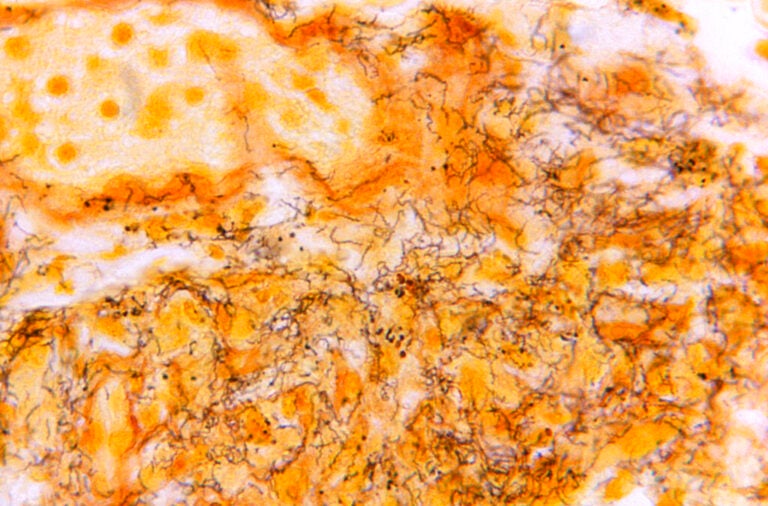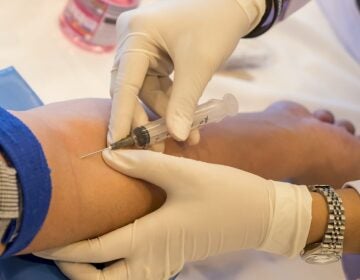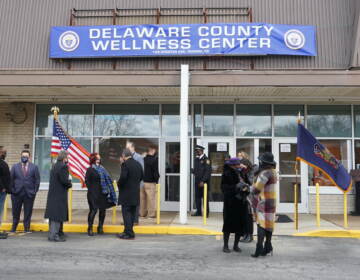Syphilis cases are rising sharply in Pa., N.J. and Del., new federal data shows
Public health experts say targeted investments in sexual health education, testing and treatment are needed to bring down syphilis infections.
Listen 1:15
File photo: This 1966 microscope photo made available by the Centers for Disease Control and Prevention shows a tissue sample with the presence of numerous, corkscrew-shaped, darkly-stained, Treponema pallidum spirochetes, the bacterium responsible for causing syphilis. (Skip Van Orden/CDC via AP)
From Philly and the Pa. suburbs to South Jersey and Delaware, what would you like WHYY News to cover? Let us know!
In just four years, the rate of syphilis infections has nearly doubled in Pennsylvania and New Jersey and tripled in Delaware.
A new report from the Centers for Disease Control and Prevention shows that infections are up across the United States, “signaling an urgent need for swift innovation and collaboration” in sexually transmitted infection prevention efforts.
It’s a trend that public health experts call worrying. They are urging for significant investments in sexual health education, testing and treatment to address the problem.
“I think a lot of us think about syphilis as a thing of days of yore, like an old thing that is not really around anymore,” said Dr. Stacey Trooskin, executive medical officer of the Mazzoni Center in Philadelphia. “But we see it in practice all the time, every day. All you have to do is look for it.”
In Pennsylvania, there were 4,486 cases of syphilis in 2022 — a rate of 34.6 cases per 100,000 people. The state’s rate of infection was 18.8 in 2018.
Local and federal health experts attribute the rise in cases to multiple factors: COVID-19 pandemic disruptions to health care screenings, decreased use of condoms among teenagers, and higher sexual health risks associated with drug use.
The early asymptomatic nature of this infection could also contribute to its spread, Trooskin said. People with a syphilis infection may eventually develop painful ulcers, sores and rashes.
“You may not notice that you have a painless ulcer, or perhaps the ulcer is in a place that you can’t visibly see it,” Trooskin said. “And so you don’t know, and it really takes being screened in order to be diagnosed and treated.”
But stigma around sexually transmitted infections continues to be a barrier to screening and testing.
“That somehow people feel that they’ve done something wrong,” Trooksin said. “Or there’s a blame or shame associated with being tested or treated for an STI.”
Syphilis can be easily treated and cured, but when it goes undetected, Trooskin said it can have devastating health effects.
“Not just in pregnant people who then have perinatal exposure for their infants, but also for individuals themselves, it can develop into neurosyphilis,” she said, which is a life-threatening complication to the brain and spinal cord.
Rates of congenital syphilis among infants, which happens when a mother transmits the infection to an unborn baby in utero, are also up in many states, including New Jersey.
The Garden State recorded 48 cases of congenital syphilis in 2022, a jump from the 13 cases recorded in 2018, according to federal data.
Public health and infectious disease experts at the Camden County Department of Health and Human Services have been closely monitoring the increased STI activity, said director Caryelle Lasher.
They’ve noted that syphilis infections have been increasing among women of childbearing age, leading to the uptick in cases of congenital syphilis.
“I think a really important area is just increasing awareness in our prenatal appointments so that we can have these conversations with pregnant people to hopefully really bring down that congenital syphilis rate,” Lasher said.
Communities and health providers need to normalize conversations about sex, Lasher said, and encourage use of condoms, especially among younger people. She said better integration of STI services and harm reduction care for people with substance use disorders can also help more people.
Public health officials in Delaware, where the rate of syphilis infection went from 13.3 cases per 100,000 people in 2018 to 42.7 in 2022, said the state plans to launch a mail order condom distribution program this summer.
Other efforts at the state Division of Public Health to bring down infections include ramping up testing efforts, expanding quick access to treatment, supporting continuing education and guidance for health providers on early identification of syphilis, and developing targeted assistance for pregnant people.
In order to bring down infections across all populations, communities will need to take a multifaceted approach and work closely together to ensure cases do not continue in this upward trend for much longer, Lasher said.
“We have more circulating in the community, and one case leads to another,” she said. “The sooner we can all collectively rally around reducing these rates, the better.”
For STI testing information in Pennsylvania, visit health.pa.gov; in New Jersey, visit nj.gov/health; in Camden County, visit camdencounty.com/service/health-human-services; in Delaware, visit dhss.delaware.gov.

Get daily updates from WHYY News!
WHYY is your source for fact-based, in-depth journalism and information. As a nonprofit organization, we rely on financial support from readers like you. Please give today.





